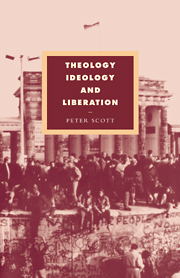Book contents
- Frontmatter
- Contents
- General editors' preface
- Preface
- Introduction
- PART I THE SHAPE OF THE ARGUMENT
- PART II LIBERATING THEOLOGY
- PART III CHRISTIAN LIBERATION?
- 5 Theology and society
- 6 Incarnation, resurrection and liberation
- 7 Society and God's trinitarian presence
- 8 Unfinished business
- References
- Index
- ADVERTISEMENT
8 - Unfinished business
Published online by Cambridge University Press: 05 December 2011
- Frontmatter
- Contents
- General editors' preface
- Preface
- Introduction
- PART I THE SHAPE OF THE ARGUMENT
- PART II LIBERATING THEOLOGY
- PART III CHRISTIAN LIBERATION?
- 5 Theology and society
- 6 Incarnation, resurrection and liberation
- 7 Society and God's trinitarian presence
- 8 Unfinished business
- References
- Index
- ADVERTISEMENT
Summary
REVIEW AND PROSPECT
I have sought to give due weight to the Marxist insistence on the social location of all intellectual production – the materiality of ideas; and on the Marxist insistence that Christianity functions as a false intermediary. I have sought to offer some thoughts on the nature of a liberative theology and on the contribution of Christianity towards political liberation that is mindful of Marxist strictures. Theology here must look to its own resources: I hope that I have developed resources available in mainstream Christianity in order to provide the materials for an engagement with Marxism. But although Christianity may have its own resources, this is a rather different issue from the matter of its social location. Here, if I am right, it is Marxism that gives the grounds for the securing of cognitive credentials – it is these credentials that theology must secure if it is to be liberative.
My concern has been to articulate a conception of Christian liberation and of the status of theological discourse that are not open to Marxist rebuttals. I have been seeking to offer the outline of a theology that is not open to the Marxist retort that theological proposals lack self-critical sense of their own social location (and so have a tendency to be ideological).
It may be of some concern that central Christian themes are being read so closely together with Marxist thinking.
- Type
- Chapter
- Information
- Theology, Ideology and Liberation , pp. 234 - 260Publisher: Cambridge University PressPrint publication year: 1994



